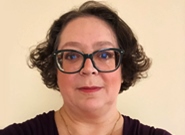 |
|
The art
of
listening
and the
importance
of study:
two
indispensable
habits |
|
|
|
|
|
|
Lara Brunelli Besquira Abalém (photo) lives in Barbacena, in the Brazilian state of Minas Gerais. She has a degree in Management and works as a volunteer at the Padre Antônio Vieira Spiritist Association, in the nearby city of Juiz de Fora. In this interview, she speaks about the art of listening and the importance of studying and learning:
How did you become a Spiritist?
Most of my family are Catholics and from a very early age I began attending mass. But, with all the respect I have for the Catholic Church, it didn’t answer the answers I had to questions concerning illnesses, social gaps, pain, war and death. I read my first Spiritist book at the age of 12, Pão Nosso (Our Bread), written by the medium, Chico Xavier, and dictated by the Spirit Emmanuel. It was a present from a dear uncle. That was my first contact with Spiritism. That’s when I began to get rational and logical answers to my questions.
What are the main positive points of Spiritism?
It’s the possibility of exploiting new perspectives in material and spiritual life. Spiritism enables us to get to know ourselves in depth and to reach into the depths of our souls so we can look at our feelings, emotions, thoughts and attitudes. And if we carry out this process without excuses or disguises, we will be able to truly assess our mental, emotional and intellectual capacities and to make a positive change of direction towards love and wisdom. Spiritism is our tool for individual transformation through knowledge and love.
Where did your passion for learning come from?
I’ve always liked to study, to learn and to find out why things happened or why they were that way. My family always encouraged learning and I grew up in a world of books. My maternal grandfather had a big library at home. I was a compulsive reader. Reading and studying has always been one of my big pleasures in life.
What would you like to say about the art of listening?
I was always a good listener, both when it concerned learning and when I needed to hear what others had to say in order to help them. I’m that person whom friends look for when they need to share their problems and secrets, or when they need to ask for help or advice. I like to listen to other people and help them look at situations from a different perspective, which often makes them able to find their own solution to the challenges they are facing. But we must be aware that listening is not the same as opening our mental field to a world of endless moaning and complaining, which some people have the habit of doing. To be a good listener is to know how to separate the “problem” from the unbalanced practice of “constantly complaining.” Those who are willing to listen are better learners and are able to provide better assistance.
And would you tell our readers about studying and learning?
We must learn as much as we can, about all fields of knowledge. We must know our own language well and learn others, if possible. We must have good general knowledge, encompassing history, politics, mathematics, literature, sciences, philosophy etc. It is indeed necessary to expand our wealth of knowledge. We must read and study the great thinkers and we must study the vast Spiritist bibliography, which goes beyond the books of Allan Kardec. I would highlight the remarkable works of Chico Xavier and Léon Denis.
And what would you advise our readers concerning the practice of listening to others?
Properly listening to other people demands common sense and discipline. To be good listeners, we must not judge. We must be able, instead, to point out the mistakes that others are making. That’s charity on our part. No one who comes to us in order to speak about a problem or a complicated situation wants to hear only criticism. What they need is support and encouragement so they are able to find out, by themselves, the solution for that particular situation or problem. It’s essential for our own progress that we develop the capacity to listen to other people.
What’s your best memory from all your experience in that field?
What stands out is that we need to be disciplined and to have a clear sense of responsibility. Discipline is essential for our development, it’s the driving force behind our will. Without discipline our achievements are mediocre. And we must have responsibility so we don’t forget our spiritual nature. From the moment you decide to depart on a journey towards knowledge and wisdom, which is personal and non-transferable , you must make a commitment to self-knowledge. There is no way of truly understanding the meaning of life when we take the spiritual dimension out of that equation.
Is there anything else you would like to add?
Let’s not set limits on ourselves with regards to love and wisdom. We must learn to love without limits, in a balanced and detached manner. Love is not possession, it’s freedom. And let’s focus, still in this incarnation, on gathering as much knowledge as we can. That’s where wisdom begins. Let’s dedicate ourselves to studying, learning and doing good deeds, with discipline and responsibility. As Léon Denis used to say: “The endless needs of the soul demand, inevitably, a life without limits.” |